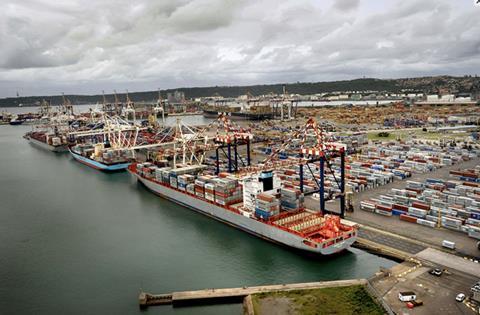Further comment has been made on solutions to the costs of inefficiencies in South African ports
International Container Terminal Services Inc (ICTSI) has said that it has taken note of the South African Bureau for Food and Agriculture Policy (BFAP) study on the cost of rail and port inefficiencies to the citrus industry.

The combined direct and indirect cost to citrus growers was quantified at R5.2bn for the 2024 season alone.
ICTSI said that although the study took the view of only one export industry in a single year, logistics inefficiencies plagued all industries across the country that relied on the ability to export without delay or prejudice – from agriculture to mining and manufacturing.
“The combined annual cost of this crisis is tens of billions of rands lost to the South African economy and decreased standing as a trading partner,” ICTSI sated.
Hans-Ole Madsen, regional head for Europe, Middle East and Africa ICTSI – which is currently in a stand-off with shipping giant Maersk about an equity share in Durban’s Container Terminal 2 – said the terminal served as the point of entry and exit for the bulk of South Africa’s imports and exports.
“The terminal as it stands currently needs investment into processes, training, and equipment,” he said.
”The level of immediate investment needed can only be accomplished through a private-public partnership (PPP), which will bring much-needed experience, expertise, efficiencies, and transparency.
”A partnership with an independent private operator will ultimately benefit the entire supply chain and boost South Africa’s global trade competitiveness,” Madsen urged.
In 2023, ICTSI won the bid to operate the Durban Container Terminal 2 after what it called “a fair, rigorous and transparent process”.
“This was a significant step forward for South Africa’s road to implement PPPs,” ICTSI said. ”However, the legal challenge by losing bidder Maersk only serves to stall much-needed progress, delaying critical improvements that South Africa’s economy urgently needs.
“Maersk, a shipping line that also operates container terminals, has since been offering equipment and expertise at the very terminal that is at the core of the forthcoming court case.
”If a shipping line such as Maersk can embed itself at the country’s container terminals, it will not be for the benefit of all users and other shipping lines docking at South Africa’s ports,” it claimed. ”Instead, it will make it possible for Maersk to look after its own narrow commercial interests.”
By contrast, ICTSI said it believed an independent operator of the port that would not favour one shipping line over another was in the best interest of the port and everyone in the South African supply chain.
“When the agreement between ICTSI and Transnet goes ahead, Transnet will receive a R11bn cash injection, as well as the expertise and experience of an international container terminal operator with an extensive footprint in highly efficient ports across the world,” it said. ”ICTSI operates 32 container terminals in 19 countries across the globe.”
ICTSI said it remained committed to working with all stakeholders to enhance South Africa’s port infrastructure and drive economic prosperity.



